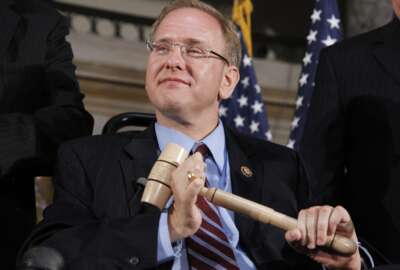The Defense Department is justifying a recent report on climate change, which a handful of lawmakers took issue with earlier this year.
Top House Armed Services Committee Democrats were disappointed that DoD “failed to fulfill its statutory mission” set by the 2018 defense authorization act, which asked the Pentagon to outline the military bases most susceptible to climate change.
But the department is contending that its study met the requirements set forth by Congress and made the response more mission-centric, rather than pinpointing threatened installations that were not as crucial to readiness.
“What we wanted to present were those installations that we knew were important,” Robert McMahon, DoD assistant secretary for sustainment, told members of the House Appropriations Military Construction, Veterans Affairs and Related Agencies Subcommittee on Tuesday. “There was a decision made that what we ought to do is focus on those installations that were most important. The 79 that we identified were identified by the Department of Defense as mission assurance installations, which we believe got to the heart of what the question was.”
McMahon added that while creating the report he wanted to stay away from highlighting bases like Bellows Air Force Base in Hawaii, which is threatened by a rising water level, but is mostly used for recreation.
The report that DoD sent to Congress said 53 of 79 critical bases are vulnerable to recurrent flooding and 60 of those installations will face that threat in the next 20 years. Additionally, 43 of the 79 bases are currently susceptible to drought and 48 will be in the next 20 years. Wildfires also pose a threat; 36 bases on the list are currently at risk, while 43 will be over the next two decades.
Still lawmakers felt the report left out crucial information.
“Looking through the lens of climate change, I do think it’s critical that we know how each base is prepared, how it’s anticipating what the future problems will be and I also think it gives us some insights into where our climate change needs are the greatest,” said Rep. Chellie Pingree (D-Maine).
House Armed Services Committee Chairman Adam Smith (D-Wash.), Intelligence, Emerging Threats and Capabilities Subcommittee Chairman Rep. Jim Langevin (D-R.I.) and Readiness Subcommittee Chairman Rep. John Garamendi (D-Calif.) sent a letter to DoD earlier this year stating the report glossed over important provisions in the law. The most glaring omission, they said, is that the report does not lay out the top 10 most vulnerable installations to climate change for each service, and does not outline any specific measures to mitigate climate change issues, including their costs.
The letter also recounted a previous letter sent to former Defense Secretary Jim Mattis about the report, which “not only reiterated the congressional intent of the law, but also offered to answer any questions the secretary may have had about portions of the law that were ambiguous.”
The tangle over the report comes as the military is trying to figure out how it will rebuild some of its bases after extreme weather caused billions of dollars in damage to some installations.
The Air Force announced Wednesday that it needs almost $5 billion in 2020 and 2021 of supplemental funding to rebuild Offutt Air Force Base in Nebraska after flooding and Tyndall Air Force Base in Florida after Hurricane Michael.
“We desperately need the supplemental funding to recover from the natural disasters that hammered Tyndall and Offutt,” Air Force Secretary Heather Wilson said Wednesday. “There are other decisions we’ll have to make if we don’t [have supplemental funding] by May or June. These are just the first decisions that we had to make yesterday.”
Wilson said the Air Force is currently deferring 61 facility repairs at 18 bases contingent on supplemental funding.
Former DoD Principal Deputy Comptroller John Conger told Federal News Network that DoD has underinvested in facilities over the years.
“This underinvestment is already a challenge,” Conger said. “When you add a layer of stress from climate change, whether it’s extreme weather or recurrent flooding or drought or wildfire, you are stressing a base infrastructure that has already had some investment shortfalls. Now the question is how can they address that issue in a greater context.”
Copyright
© 2024 Federal News Network. All rights reserved. This website is not intended for users located within the European Economic Area.

